We cannot plunge ourselves into a religious war
Send your letters in to letters@independent.co.uk

The horrid slaughter of a French priest is never bound to trigger religious animosity between communities. I just arrived from Nice. I lived very close to Promenade des Anglais, the place that witnessed the mass murder of innocents. One can feel palpable tension in the city. However, we must all remember that 30 of the victims were Muslims themselves and that terror organisations have murdered so far more Muslims than Christians, Westerners or any other minorities since its inception.
His Holiness Pope Francis was right to reiterate the salient fact that the world is at war, but it is not a war of religions. Wisdom must prevail. There is every need to reinvigorate and put into practice the Amman message, an illuminating script instigated by His Majesty King Abdullah II of Jordan that sought to clarify the true tenets of Islam to the entire world.
It offers a fertile ground for constructive interactions between people of diverse religious denominations. As we live in an uncertain and unstable world, where dark forces are threatening to tear us asunder; this message becomes imperative to remind us of the common values that bind us all: compassion, mercy, equality, fairness, justice, kindness, inclusiveness and moderation.
Dr Munjed Farid Al Qutob
London NW2
We should raise interest rates
Hamish McRae is right to challenge the current policy of low interest rates (Why our post-Brexit economy can't be saved by slashing interest rates).
After the financial crash, interest rates were slashed in the hopes of stimulating the economy. Cheap money would generate new investment, it was believed. But companies at the time didn't need cheap money, they had plenty of their own money sitting in great cash piles back then. They needed demand for their products and services. But a large proportion of the consuming public, those reliant on income from savings, had just experienced a 95 per cent reduction in their interest payments (5 per cent on the best savings accounts down to 0.25 per cent if you were lucky).
Add to that the austerity programmes since 2010, and there has been a continued downward pressure on consumption.
Negative interest rates will make that dynamic worse.
Cheap money since 2008 has merely popped out of the economic system as rising house prices.
And quantitative easing is not the same as “helicopter money”. It puts money into the banking system, not consumers in the general economy.
Try raising interest rates: nothing else has worked.
David Humphrey
Ealing
We need to reassess the Brexit evidence
Before the referendum, the frenzied speculation about the effects of Brexit was just that – speculation. But we can now begin to see the contours of the future. By December we shall know, from the rival statements of UK and EU negotiating teams, whether it is likely there will be any benefits from two years of costly negotiations at the end of which we shall be cast off into a legal limbo.
Circumstances are likely to have changed so radically in six months that it will be possible for MPs (with a free vote) to make a totally fresh assessment of the enormous range of new evidence before them. There will no longer be any reason to feel bound by a referendum decision that was based, at best, on guesstimates.
We are lucky that the abdication and prevarications of the Vote Leave leaders have given us this important period for reflection. A vote by our elected representatives in December, whichever way it goes, will be much more considered and well supported by relevant evidence than was possible in June.
Charles Freeman
Woodbridge
Nicola Sturgeon is spinning divisive rhetoric
Nicola Sturgeon will be disappointed by Theresa May's speech in Italy in which she expressed her wish, expectation and intention to guarantee the rights of EU citizens in the UK post-Brexit.
Until now, Sturgeon has regularly used EU citizens as pawns in her relentless game of them and us with the UK Government, paradoxically maintaining they were being regarded as “bargaining chips”.
With immigration law entirely controlled by Westminster, Sturgeon’s protestations that immigrants could remain in Scotland is irresponsible and misleading for those involved. That said, not even Nigel Farage nor Boris Johnson has ever suggested EU citizens should leave. So is Sturgeon simply grandstanding?
May has the responsibility of both securing the welfare of UK citizens abroad and EU citizens here. It would seem Sturgeon is more concerned with divisive rhetoric.
Martin Redfern
Edinburgh
To be in the EU, or not to be in the UK? That is the question Scotland’s First Minister wants us to imagine we answered, thinking she wins either way.
But that was not the choice, and no amount of noise and activity will make it so.
Keith Howell
West Linton
Obama should consider his words
President Obama is quoted as saying (Independent, 28 July): “It was possible that Russia would try to influence the US presidential election.”
Clearly it would be totally unacceptable for a world power to interfere with the democratic election of another sovereign state!
Geoff Cottage
Stirling

Join our commenting forum
Join thought-provoking conversations, follow other Independent readers and see their replies